
It comes as no surprise that the issue of homework in elementary classrooms is quite the hot topic these days. In thinking about starting my year back in the classroom I decided that I – like many other teachers around the world -was going to outlaw homework!
… then I began to reflect on my decision and wondered if choosing for everyone not to have homework, was any better than choosing for everyone to have homework. Either way you slice it, I as the teacher, was the owner of that decision and that was something I was no longer comfortable with in trying to achieve more democratic classroom.
So I decided to take a collaborative approach and invite students and parents in on the decision making. Here is how it went!
Tuning In
Before delving too deep I wanted to tune into what students already thought about homework. So I posted “agree”, “disagree”, “sometimes” and “I’m not sure” around our classroom and I projected the following quote:
“Homework is essential to learning”
There were a range of responses and as students shared the reasoning behind their opinions, many students shifted from one group to the next.
Provocation
Then I invited students to watch this Alfie Kohn interview to provoke their thinking about homework. They backchannelled throughout the video to share their thoughts, questions and connections.
Finding Out
After that, I told them that they would be deciding if they had homework – together with their families – but in order to make an informed decision we had to explore all the perspectives surrounding homework. To help with this we used to Visible Thinking Routine – Circle of Viewpoints.

Then we divided into teams that would each inquire into a different perspective. Each team had a different approach to collecting data:
The “student” team posted a Twitter poll and collected tallies at recess.

The “parent” team sent a Google Form home to all the parents.
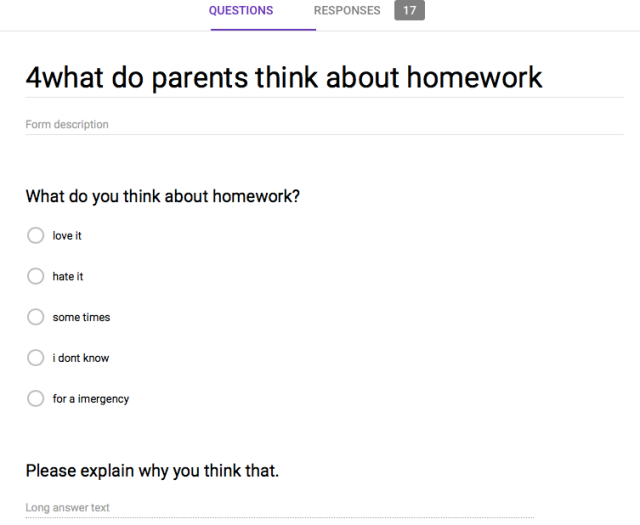

The “teacher” team walked around the school and collected quotes from teachers about homework.
The “administrator” team sent the principal, assistant principal and superintendent an email.
The “media” team explored articles and videos I shared with them.
The “other schools” team browsed this school’s blog about their homework inquiry.
The “our school” team looked at the homework policy in the school handbook.
Sorting Out
Once all the teams had their data they had to go through it and decide what was important, what was worth taking note of and how they were going to consolidate and display it.
Some wrote a summary:

Others used graphs:

Some used statistics:
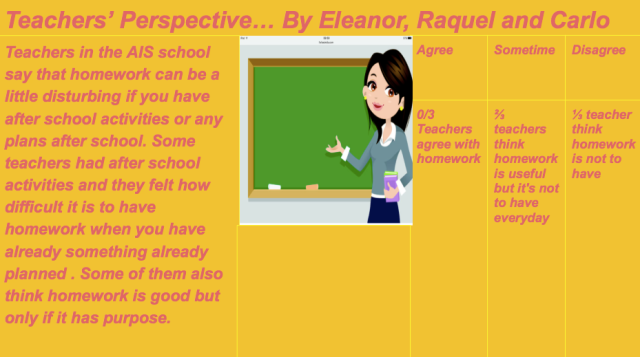
Others used quotes:
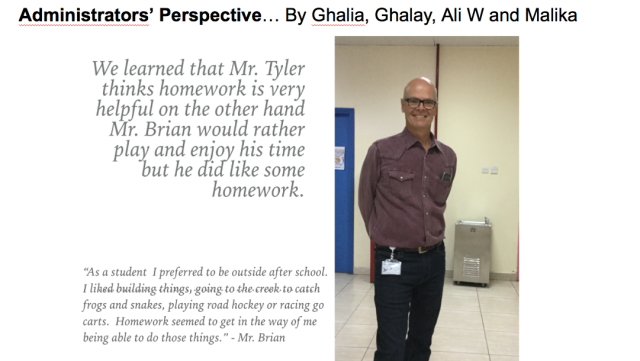
Some used hyeperlinks:

Others used photos:

Making Conclusions
Then we put it all together and emailed this Google Slideshow home to our families. From there, families explored all the perspectives together and made a decision about whether or not they wanted homework in Grade 4.
Final results: 9 chose homework 14 chose no homework
Taking Action
I pulled together the 9 students that opted to have homework this year and together we used the Start With Why framework to make a plan.
First students focused on why they wanted homework, then how they wanted it to work, then finally what specifically they would do to accomplish those goals.
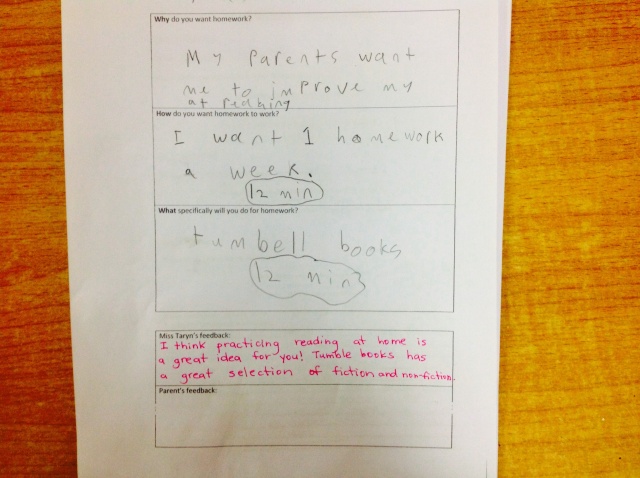

Some students made themselves choice boards:

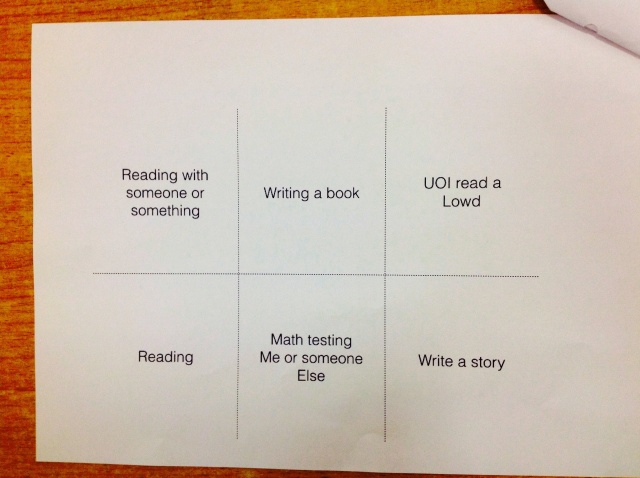
Other students planned out each night of the week:


Next, I provided feedback about their plan and then they brought it home to get feedback from their parents as well.
Now we are finally ready to put these differentiated, student-led, family supported homework plans into action!
My Reflections
- there was so much math and literacy in this inquiry
- it was a great way to explore the concept of perspective
- the format allowed for students to express their discovers using new literacies and multimodalities
- the parents were amazing partners in this inquiry
Now that it is all over, I can rest assured that the students and families who want homework have it and the students and families who don’t want homework don’t have it. Everyone is happy and the ownership and control rests with the learners themselves… as it always should.


Pingback: An inquiry into homework #edchat Inquire Within ht… | EducatorAl's Tweets
Wow! Thanks for sharing this inquiry journey I thinks in a great example of real world structured inquiry and for such an important topic!
I wonder did you get your administrator to back you up? Does your school hw policy allow for no hw? Did u face any challenges especially with parents who maybe really support and demand hw?
LikeLike
Hi Daniela,
Thanks for your comments and questions. It was a really wonderful inquiry! My administrators were wonderful participants in the inquiry and the school policy was one of the perspectives students used and shared with their families to make an informed decision. So students are parents were well aware of the school (as an institution)’s perspective about homework before making their final choice. I faced no challenges with parents! Because of the differentiated approach, parents who strongly believe in the value of homework were able to voice that opinion and in the end choose for their child to have homework. I also found that most of the parents who were interested in homework also had who children who were interested in homework, and most parents who did not value homework also had children who did not value homework. I only had one family were the students and parents had different perspectives and it was cool to see them reach a balanced, compromise.
LikeLike
I also enjoyed reading your post. I was particularly interested in how easily you threaded thinking routines into the exploration. An authentic and relevant area to explore together.
LikeLike
What a refreshing and informed way to approach the concept of homework. As a teacher of more than 20 years, I have often been plagued by how homework affects children and families. Now a father of two girls in Prep and Grade 2, I find it very difficult to approach the school about the poor way they approach homework, without sounding as though I am an interfering teacher from outside their school. I will certainly be sharing your concept and approach. I love it!
LikeLike
Thanks Andrews! Good luck! 🙂
LikeLike
Quite insightful. A typical question of To be or not to be. I an really impressed with the outcome of this inquiry and I am sure school like mine can take some inspiration from this bold step to bring greater customer satisfaction. Nonetheless, I think it will most suitable to have such engagements right at the start of the academic year. I want to imagine how new parents can fit into such a system…..definitely they won’t have the luxury of having the whole inquiry cycle revisited. Great piece of work…!
LikeLike
Thanks! It was a great collaborative inquiry for our community – me, students and parents too! It brought us all together and started the year off with space for student and family voice in the decision making process. 🙂
LikeLike
Pingback: Diigo Links (weekly) | Mr. Gonzalez's Classroom